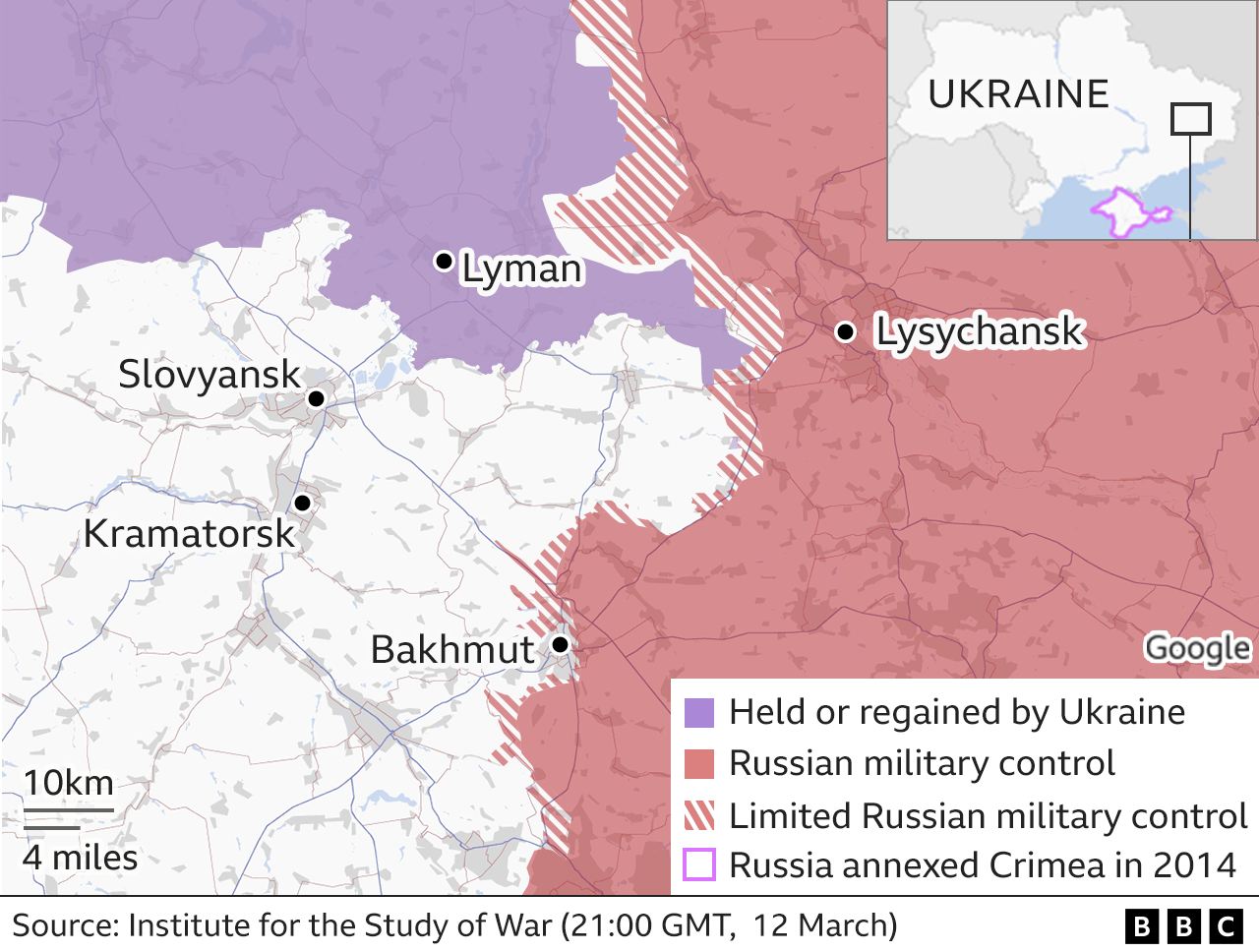Ukraine war: Heavy losses reported as battle for Bakhmut rages
Ukraine and Russia have reported inflicting heavy losses as the battle for Bakhmut rages on.
Moscow has been trying to take the eastern Ukrainian city for months in a grinding war of attrition.
Ukrainian President Volodymyr Zelensky said Russian forces had suffered more than 1,100 deaths in the past few days, with many more seriously injured.
Russia said it had killed more than 220 Ukrainian service members over the past 24 hours.
The BBC is unable to verify the numbers given by either side.
Analysts say Bakhmut has little strategic value, but has become a focal point for Russian commanders who have struggled to deliver any positive news to the Kremlin.
Capture of the city would bring Russia slightly closer to its goal of controlling the whole of Donetsk region, one of four regions in eastern and southern Ukraine annexed by Russia last September following referendums widely condemned outside Russia as a sham.
Ukrainian commanders, who have committed significant resources to defending the city, say their strategy aims to tie Russia’s forces down and prevent Moscow from launching any further offensives in the coming months.
“In less than a week, starting from 6 March, we managed to kill more than 1,100 enemy soldiers in the Bakhmut sector alone, Russia’s irreversible loss, right there, near Bakhmut,” Mr Zelensky said in his nightly video address.
He added that 1,500 Russian soldiers were wounded badly enough to keep them out of further action.
Russia’s defence ministry said Russian forces had killed “more than 220 Ukrainian servicemen”.
The commander of Ukraine’s ground forces, Col Gen Oleksandr Syrskyi, said the Russian mercenary Wagner Group was attacking his troops from several directions in a bid to break through defences and advance to the central districts of the town.
The paramilitary organisation is at the heart of the Russian assault on Bakhmut. Its leader, Yevgeny Prigozhin, has staked his reputation, and that of his private army, on seizing Bakhmut.
He said on Sunday that the situation in the city was “difficult, very difficult, the enemy is fighting for every metre”.
“And the closer to the city centre, the fiercer the fighting,” he said in a voice recording published on Telegram.
After his envisioned capture of Bakhmut, “we will begin to reboot” and “will start recruiting new people from the regions”, he said.
And on Saturday, the Institute for the Study of War – a US think tank – reported that Moscow’s offence was stalling.
“Wagner Group fighters are likely becoming increasingly pinned in urban areas… and are therefore finding it difficult to make significant advances,” it said.

There were about 70,000 people living in Bakhmut before the invasion, but only a few thousand remain. The city was once best known for its salt and gypsum mines and huge winery.
Those who remain in the city risk a hazardous existence, with four people injured in Bakhmut on Monday, Donetsk regional governor Pavlo Kyrylenko said.
Like Russia, Ukraine has also given Bakhmut political significance, with President Zelensky making the city an emblem of resistance.
When he visited Washington in December, he called it “the fortress of our morale” and gave a Bakhmut flag to the US Congress.
Western officials estimate between 20,000 and 30,000 Russian troops have been killed or injured so far in and around Bakhmut.
A draft law introduced in the Russian parliament on Monday aims to push back the age bracket for compulsory military service, from the current 18-27 years to 21-30.
Reuters reported that, due to the transition period between the old legislation and the new, 2024 and 2025 would see the conscription age span 10 or 11 years rather than the usual nine – meaning more men would be eligible to fight.
Russia’s previous attempt to draft thousands of new recruits into the Ukraine war met with some resistance. In September the announcement of a partial military mobilisation saw long queues form at border crossings as men of draft age sought to flee the call-up.
The Kremlin said reports of fighting-age men fleeing had been exaggerated.
Besides the Bakhmut fighting, seven residents were injured elsewhere in Donetsk region on Monday, governor Pavlo Kyrylenko said.
Further east in Luhansk, regional governor Serhiy Haidai said the Russians had “significantly intensified shelling” on the front line. He added that Russia was bringing more and more equipment and troops to the area.
Elsewhere in eastern Ukraine, there were 47 attacks on Ukrainian troops in Zaporizhzhia, according to the regional administration.



